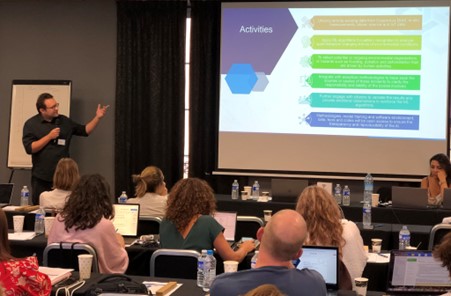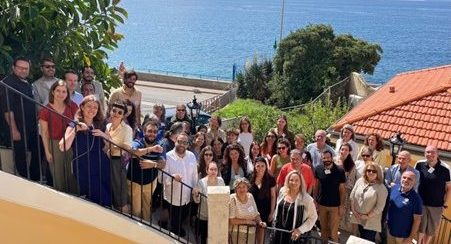The new Horizon Europe initiative, ENFORCE (Empower citizeNs to join Forces with public authORities in proteCting the Environment), brings together 25 partners from 10 European countries, aiming to drive the development of participatory environmental monitoring and enforcement systems, and advance environmental governance practices, in line with the Green Deal Data Space initiative.
ENFORCE is funded under the “Food, Bioeconomy, Natural Resources, Agriculture, and Environment” pillar, with a total budget of €7.3 million, and co-funded by the UK Research and Innovation (UKRI) under the UK government’s Horizon Europe funding Guarantee. Coordinated by G.A.C. (France) and University of Thessaly (Greece), ENFORCE aims to bring communities and authorities together to ensure compliance with environmental regulations and promote sustainable management practices.
The Centre for Water Systems (CWS) at the University of Exeter will lead the development of spatial intelligence and reproducible AI to create a series of machine learning algorithms to analyse earth observation datasets for identifying patterns about potential environmental compliance incidents. The ML approaches will be complemented by analytical methodologies such as hydrogeological analysis, contaminant fingerprinting, and chemical fate and transport modelling.
CWS will also collaborate with the Westcountry River Trust to test the environmental forensic technologies in the East Devon Catchment for detecting environmental pollution to preventing environmental crime.

CWS has gathered a strong team, including Professors Albert Chen, Slobodan Djordjevic and Dragan Savic, and Drs Lydia Vamvakeridou-Lyroudia and Mehdi Khoury, and Mr Gareth Lewis to participate in the ENFORCE project.
“We are extremely excited to part of the ENFORCE consortium, advancing scientific research to protect our valuable environment! The CWS brings extensive expertise in water system modelling and hydroinformatics analysis, which are critical for understanding the causes and sources of water-related environmental pollution.”
Prof Albert Chen, Centre for Water Systems
Environmental compliance is essential for protecting natural resources and mitigating the impacts of pollution on human health and ecosystems. However, existing practices often struggle with challenges such as inconsistent data and a lack of coordination among stakeholders. ENFORCE tackles these issues by leveraging citizen science and innovative technologies to ensure that locally collected environmental data meets the standards and formats required by authorities for effective enforcement actions.
To achieve this, ENFORCE will develop creative toolkits and protocols that align citizen-collected data with official standards, enhancing its admissibility in court and its utility in environmental compliance cases. The project introduces the concept of Data Readiness Level (DRL), a framework designed to evaluate the maturity of data for use as legal evidence. It will also employ geo-spatial intelligence and AI-enhanced tools to improve data quality and reliability.
ENFORCE strives to move beyond awareness-raising to empower citizens and public authorities towards co-creating a pan-European collaboration and innovation hub to mainstream the use of citizen science for environmental compliance assurance: the ENFORCE Plaza.
Aligned with the European Green Deal, ENFORCE sets out to achieve 4 main objectives:
- Promoting Compliance: Engaging citizens in the collection of high-quality environmental data through digital tools, visualizations, and social media strategies. This includes a co-created plan for preventing environmental crimes and encouraging voluntary compliance.
- Monitoring Compliance: Developing best practices for the collection and verification of data, ensuring that it is fit-for-purpose and can be used as legal evidence. This involves integrating various data sources, including citizen science, field-based sensors, and satellite images.
- Enforcing Compliance: Enhancing the capacity of authorities to act on citizen-collected data, improving the collection of admissible evidence for environmental crime prosecution, and organising training workshops to upskill stakeholders in the use of digital tools and evidence collection.
- Creating a One-Stop-Shop for Environmental Compliance: Establishing the ENFORCE Plaza, a collaborative platform that will serve as a meeting place and resource hub for environmental compliance initiatives, fostering collaboration among citizens, municipalities, and innovators.
“Through the toolkits created in ENFORCE, we will empower and protect citizens via online evidence gathering that supports decision making towards environmental safeguard.”
Dr Mehdi Khoury, Centre for Water Systems
ENFORCE’s outcomes will support the European Union’s broader sustainability goals and align with the UN’s Sustainable Development Goals (SDGs), particularly in fostering sustainable cities and communities through enhanced environmental governance.
The project will be implemented through 8 case studies across Europe, including Valle Galeria (Italy), Brașov (Romania), Crete (Greece), Barcelona Urban Beaches (Spain), Puglia (Italy), Flanders (Belgium), East Devon Catchment (UK), and Amsterdam (Netherlands). Each location presents unique environmental challenges, allowing ENFORCE to tailor its approach to meet local needs. By engaging grassroot organisations, local and regional authorities, and a diverse group of researchers, ENFORCE aims to develop a robust, interdisciplinary strategy for effective environmental monitoring and enforcement.
The project officially began on 1 September 2024 and will run until 31 August 2028, while the consortium officially inaugurated the project’s activities during a two-day meeting in Nice, France, on September 10th and 11th, 2024. This assembly, hosted by project coordinator G.A.C. Group (France), brought together 48 representatives from all partner organisations and established the foundation for a collaborative effort spanning 4 years.
“My main impression from the ENFORCE kick-off meeting was that we increased even further the breadth and multidisciplinarity of the approaches developed and implemented in our portfolio of EU projects, in particular through collaboration with legal experts and social scientists”.
Prof Slobodan Djordjevic, Centre for Water Systems

